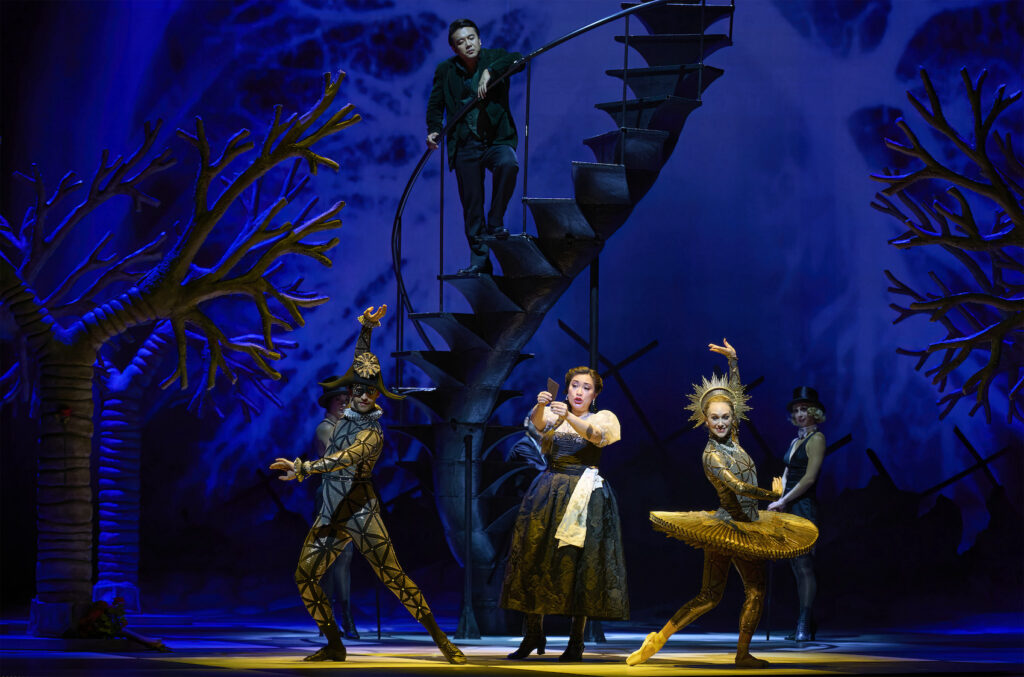His faith was as passionate as it was considered, bearing Charles Gounod through life with undisguised zeal, a ceaseless commitment to matters of strict Catholic creed that was forever destined to wage inner battle with his undying enthusiasm for the earthy delights of popular music theatre.
Claiming to have undertaken holy orders as a student in Italy — a patent falsehood, although he had, in fact, won a prestigious scholarship, the Prix de Rome, to study music there — Gounod returned to Paris dressed in the habit of a Dominican friar, demanding, in all seriousness, to be addressed as Abbot Gounod.
Roughly a decade later in 1859, the composition that would forever enshrine his operatic reputation, Faust, debuted at the Théâtre Lyrique, an ideal fit for the period — tense, sentimental, clipped — far removed from 18th century literary visionary Johann Wolfgang von Goethe’s sprawling two-part transcendental tragedy.
The young composer’s penchant for reverence and romance, piety and melodrama never deserted him.
With its all-new production of Gounod’s decidedly conflicted magnum opus, a tale of fleshy desire fuelled by an infernal usurper of Godliness, the Canadian Opera Company strikes a less than illuminating pose, bartering soulfulness for metaphor, clarity for invention. Staging and stagecraft, overseen by director Amy Lane, betrays intention here, a largely regie-driven manipulation of action and locus.
A parade of uniformed infantrymen becomes a synchopated chorus line, cut-out carbines twirling. A troubled young woman furiously pencils hidden sketches. A busybody neighbour presents Méphistophélès with a tea cart laden with cakes.
Designer Emma Ryott’s set, a vastly expanded, anatomically correct depiction of the human pulmonary system, eerie bronchial trees branched and knotty; an immense spinal staircase twisting upwards centre stage; a colossal chest x-ray filling the panoramic Four Seasons Centre cyclorama, is decidedly not for the squeamish. Or those in search of meaning, implicit or otherwise. Faust’s soul, his innate spiritual life force, so willingly traded to Méphistophélès for youth, given palpable dimension, perhaps. Or the opera’s audible source of greatness made visible. Or a grim reminder of COVID, a shattering plunderer of human vitality. All and none are equally plausible. Legible signposts are in abundant short supply in this opaque undertaking.
Costuming is equally confusing, an obtuse, disconnected collection of eclectic period styles. Faust dresses in contemporary casual street attire; Méphistophélès in Fred Astaire evening wear. Marguerite, the opera’s hapless heroine, favours serviceable Biedermeir frocks. The aforementioned troop of Second Empire foot soldiers sports historically correct plumed caps and brass-buttoned campaign coats per Gounod’s day. A pair of slinky demons (vampishly inhabited by Sierra Richardson and Tina Desroches) prowl for victims, all garters and black stockings and alluring tailoring, émigrés from some smoky Weimar Era cabaret. The overall effect conjures images of Halloween, surely no coincidence given the decision to program Faust at the height of haunted opera house season.
If there is any saving grace to the COC’s latest turbulent Fall 2024 production, a co-venture with Sweden’s restive Malmö Opera, it is in the unstinting commitment of its performing artists to Gounod’s churning, quasi Wagnerian score.
Singing a taut, ringing Faust, rising tenor headliner Long Long vocally dominates the evening, his voice sweeping upwards from a broad lower register, topping out in bold punctuation, crystalline and sparkling. Gounod’s justifiably celebrated Act III reverie, Salut! demeure chaste et pure, with its dreamy drift from romantic lyricism to exhilarating high C is sung with thrilling vibrancy and firm command.
Appearing in the role of Marguerite, Faust’s pivotal love interest, soprano Guanqun Yu tugs at the heart. Guileless. Tender. Doomed. A figure of no small fascination for Gounod and librettists Jules Barbier and Michel Carré alike. Enthroned centre stage in Carré’s source play Faust et Marguerite, the character achieved ever greater prominence as Gounod’s masterwork evolved from Opéra-comique, with spoken recits, to through-composed Grand Opera. As a focus of bitter tragedy, Guanqun’s Marguerite compels close attention, journeying from the lilting, decorous wide-eyed naïveté of O Dieu! Que de bijoux! (splendidly supported by Jewel Song dancers Brooklyn Marshall and Jack Rennie) to the final towering apotheosis of Anges purs! anges radieux!. The voice, spirited and dauntless, glows with energy.
Bass-baritone Kyle Ketelsen vocally delights as Méphistophélès, slick as a silk bowtie, menacing and debonair, his devilishly seductive, Vous qui faites l’endormie, sung with a sly, delicious note of menace.
Revelling in a classic trouser role, mezzo-soprano Alex Hetherington sings Siébel, Marguerite’s hopelessly infatuated, impossibly youthful suitor, her touching, breathlessly boyish Faites-lui mes aveux — one of only a few all too brief arias accorded the character by Gounod — bubbly, bright and open hearted.
Baritone Szymon Mechliński sings a fine, hot-blooded Valentin, vengeful brother to Marguerite. Korin Thomas-Smith is student friend and ally Wagner. Mezzo-soprano Megan Latham is busy, bustling neighbour Marthe.
The Canadian Opera Company Chorus delivers a seemingly endless succession of choral conquests, launching the evening on a boozy high note with Vin ou bière, later underlining a moment of profound spirituality with Quand du Seigneur le jour luira concluding with a collective cry to heaven in praise of Marguerite’s salvation.
Leading a divine Canadian Opera Company Orchestra, resident music director Johannes Debus conducts with sweeping authority, great crescendos of emotion thundering around him; strings and woodwinds, a community of embraces; brass, a declaration of life; percussion, a communal heartbeat.
Problematic direction and design cannot diminish the power or the humanity of Gounod’s eternal music.


